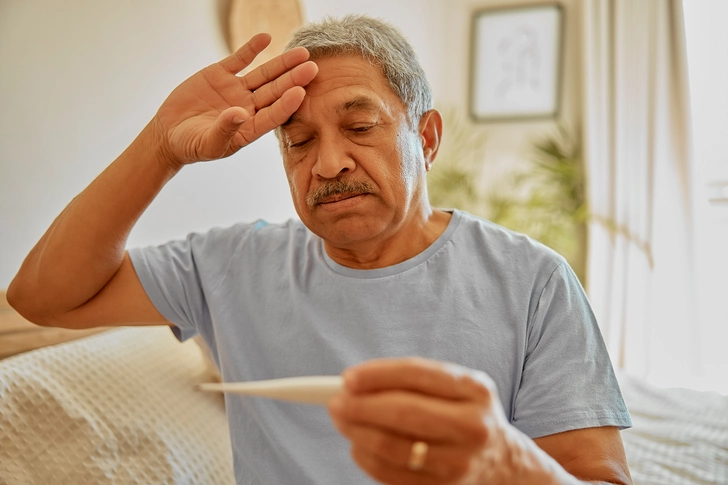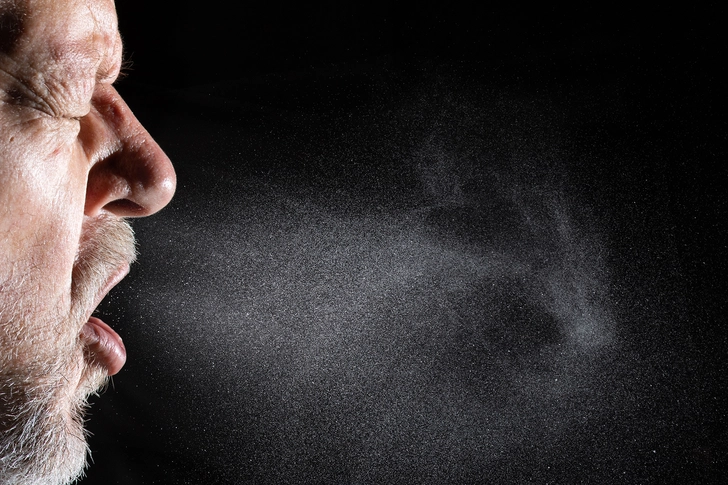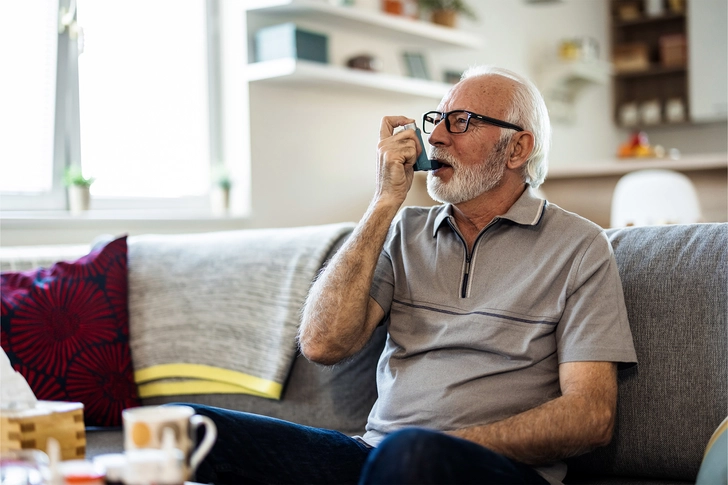- Overview
- Signs & Symptoms
- Tests & Procedures
- Lung Diseases
- Pneumonia
- Bronchitis & Bronchiolitis
- Respiratory Syncytial Virus (RSV)
- Tuberculosis (TB)
- Nontuberculous Mycobacterial (NTM) Lung Disease
- Other Respiratory Infections
- Interstitial Lung Diseases & Fibrosis
- Hypersensitivity Pneumonitis & Related
- Lung Tumors & Nodules
- Pulmonary Hypertension
- Pleural Conditions
- Other Lung Conditions
- Environmental Impacts on Lung Health
- Therapies & Management
- View Full Guide
RSV In Older Adults


Understanding RSV in Older Adults
Respiratory syncytial virus (RSV) can significantly impact older adults, often leading to severe respiratory illness. Learn the symptoms, how it spreads, and how to prevent it.

Higher Risk for Older Adults
If you're over 60, you're more likely to get seriously ill from RSV. This can lead to serious complications, hospitalization, and death.

Recognizing Symptoms
In older adults, RSV symptoms can be easily mistaken for a common cold. Look out for a runny nose, cough, low-grade fever, and decreased appetite.


How RSV Spreads
RSV spreads through droplets when someone coughs or sneezes. It can also spread by touching contaminated surfaces and then your face.

Diagnosing RSV
A doctor will review your medical history and do a physical exam. Lab tests, such as the rapid RSV antigen test or molecular tests, can confirm the diagnosis.

Available Treatments
RSV treatment focuses on treating your symptoms. Over-the-counter pain relievers or fever reducers can help, but severe cases might need IV fluids or oxygen.

Preventing RSV
Get vaccinated if you are eligible, wash your hands often, and avoid close contact with anyone who is sick. Disinfect surfaces to reduce the spread of RSV in your home.

RSV Vaccination
Vaccination is recommended for all people ages 75 and older. People ages 60 to 74 who are at increased risk for severe disease due to RSV should also get vaccinated.

Impact on Chronic Conditions
RSV can worsen chronic conditions such as asthma and heart failure. It's important to manage these conditions and watch out for RSV symptoms.

Reduce Your Risk
Not all older adults with RSV will need medical treatment. But some may become seriously ill. Getting vaccinated can greatly reduce the risk of severe RSV complications.
Photo Credits:
1) Akkalak Aiempradit/Shutterstock
2) AshTproductions/Shutterstock
3) E+/Getty Images
4) Science Photo Library/Getty Images
5) Rainer Fuhrmann/Shutterstock
6) Yuri A/Shutterstock
7) Gorodenkoff/Shutterstock
8) Maridav/Shutterstock
9) Phawat/Shutterstock
10) Jelena Stanojkovic/Shutterstock
11) Monkey Business Images/Shutterstock
SOURCES:
William Schaffner, MD, spokesperson and former medical director, National Foundation for Infectious Diseases.
CDC: “RSV in Older Adults and Adults with Chronic Medical Conditions,” “Respiratory Syncytial Virus.”
National Foundation for Infectious Diseases: “Facts about Respiratory Syncytial Virus.”
American Lung Association; “RSV Treatment and Prevention.”
MedlinePlus: “Respiratory Syncytial Virus,” “Respiratory Syncytial Tests.”
Norton Healthcare: “RSV Can Be Deadly in Adults Age 65+.”
Clinical Microbiology Reviews: “Respiratory Syncytial Virus Infection in Adults.”
UpToDate: “Respiratory syncytial virus infection: Treatment.”
Pfizer: “Pfizer Announces Positive Top-Line Data from Phase 3 Trial of Older Adults for its Bivalent Respiratory Syncytial Virus (RSV) Vaccine Candidate.”
American Medical Association: “RSV vaccines: Questions patients may have and how to answer.”
Mayo Clinic: “Guillain-Barre syndrome.”
CDC: “Frequently Asked Questions About RSV Vaccine for Adults,” “Respiratory Syncytial Virus Infection (RSV),” “RSV Vaccination for Older Adults 60 Years of Age and Over,” “RSV Transmission,” “Symptoms and Care.”
Columbia University: “Everything You Need to Know About the RSV Vaccine.”
Cleveland Clinic: “Why Is RSV Different Now Than In Past Years?”